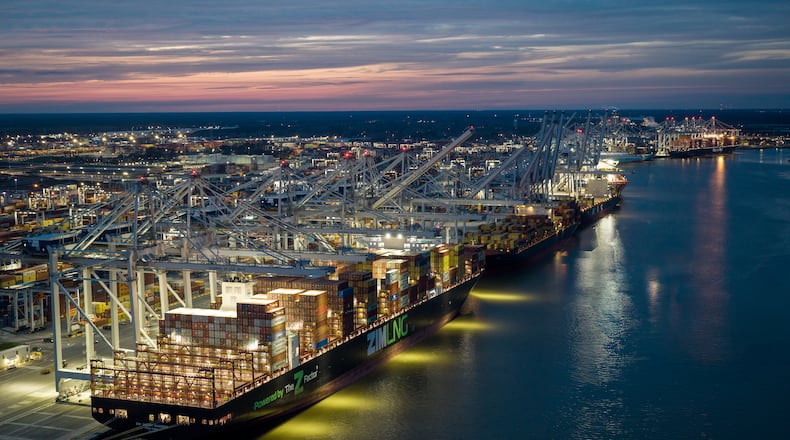Global shipping is slowing a month after President Donald Trump’s “Liberation Day” escalation of the trade war. Georgia companies, workers and consumers could soon feel that softening.
While the state’s trucking industry isn’t “seeing anything ground shaking yet, I think we’re starting to see some ripples,” Seth Millican, president and CEO of the Georgia Motor Trucking Association, told The Atlanta Journal-Constitution.
“But I think probably in another two to three weeks,” he said, “those ripples are going to start turn into waves.”
Those sentiments are shared by trade-related industry professionals across the state, from retailers and logistics pros to ports officials and dockworkers. Trump imposed a 10% tariff on all imports on April 5 and has since enacted a minimum 145% duty on most Chinese goods. Canada and Mexico also face steep levies, some of which are on pause. Foreign autos face a 25% tariff, though Trump relaxed import taxes on certain auto parts in recent days.
Those actions are now being felt at the top of the international freight pipeline: The trade war has already caused many maritime shippers to pause or cancel upcoming shipments.
There’s been an “extreme” surge in canceled sailings starting the week of May 5, according to industry data from Sea-Intelligence.
Credit: Stephen B. Morton for The Atlanta Journal Constitution
Credit: Stephen B. Morton for The Atlanta Journal Constitution
Economists at private equity firm Apollo Global Management are projecting that could in turn prompt a “halt” in national trucking demand by mid to late May, followed by layoffs hitting the trucking in retail industries in late May to early June and a recession this summer.
Across the country, consumer confidence is at a record low, tourism is slowing and companies have been front-loading inventory purchases before the tariffs took effect, the economists said. Empty shelves could be on the horizon if the trade war lingers.
Millican said he’s hearing from his trucking association members with “hard choices to make: Do we raise prices? Do we reduce level of service? We’ve got some companies asking, ‘Do I just close the doors?’”
About three-fourths of Georgia communities are completely dependent on trucking to receive their goods, he said.
Much of the initial fallout will be concentrated on the West Coast. The Georgia Ports Authority just closed a busy April. While volume numbers won’t be available for another week, spokesperson Tom Boyd said Friday the Savannah container terminals continued to average 30-plus vessel visits per week throughout the month.
Boyd said traffic is expected to “moderate” in May but to what extent remains uncertain. Workers within the International Longshoremen’s Association unions who work the Savannah docks said they expect to see a cut in labor hours beginning in the next two weeks as ship visits drop. The workers requested anonymity because they were not authorized to comment for the record.
Yet Savannah is somewhat insulated relative to other U.S. ports. The ports authority and its primary users have made diversifying their cargo sources a priority in recent years. China currently represents 33% of the port’s business, down from 49% in 2018, while overall volume through Georgia’s ports increased nearly 29% during that span.
Credit: Courtesy of Georgia Ports Authority
Credit: Courtesy of Georgia Ports Authority
The ports authority hosted its annual customer appreciation event, the Georgia International Trade Conference, at Sea Island last week. The tone among the attendees was not one of panic, according to the ports spokesperson, as shippers have been “scenario planning” for many months now.
Today is their focus because of future uncertainty, Boyd said, adding that the current climate has further accelerated a supply chain shift away from China to other Asian countries, such as India.
“This is a pivotal moment for trade sourcing,” Boyd said.
Those farther down the logistics chain foresee a different kind of reckoning. Global shipping and delivery giant UPS CEO Carol Tomé said recently: “The world hasn’t been faced with such enormous potential impacts to trade in more than 100 years.”
The company saw a drop in domestic parcel volume in February and March and suspended its annual financial projections given the question marks — as did Georgia-based Delta Air Lines and children’s apparel retailer Carter’s.
Railroad company Norfolk Southern CEO Mark George said in late April that while his company’s largely domestic volumes have remained stable, “there’s no way to predict where we go.”
Norfolk Southern Chief Commercial Officer Ed Elkins added that they are seeing traction with customers who “clearly want to save money,” as rail shipping is generally cheaper than trucking.
CSX rail confirmed it saw an increase in shipping container deliveries in the first quarter given customers’ inventory front-loading.
As that supply dwindles, a goods shortage could follow. Yet economist Jeff Humphreys with the University of Georgia’s Selig Center of Economic Growth sees the scenario as a sales opportunity for producers of non-traded goods and services, such as those based in the U.S.
“A scarcity of traded goods will not cause households to increase their savings rate like they did during the pandemic-related shortages,” he said.
A ‘tough’ baseline
In Georgia’s trucking industry, the past few years have already been “tough” coming out of COVID-19 with low rates and an ongoing driver shortage, said Millican of the trucking association.
High insurance costs have been a top issue for Georgia truckers, he said, and there had been some optimism for relief in the wake of so-called “tort reform” at the state Capitol.
Credit: JOHN SPINK / AJC
Credit: JOHN SPINK / AJC
His members are also happy to see certain Trump administration policies including tax reform and deregulation, he said.
But that optimism is running into the uncertain implications of the tariffs and the high likelihood that imports off-loaded at the Georgia Ports Authority terminals could be held on-site as the trade war plays out. Cargo is not subject to tariffs until it clears customs ahead of being trucked or moved by rail to its next destination, and terminals in Savannah and Brunswick have significant storage space available, a ports authority official confirmed.
“What we know today, could be completely different tomorrow,” Millican said.
Compounding this is the underlying fact that the state Department of Transportation recently predicted Georgia will double its freight volumes in the next 25 years.
Truckers have been planning with that demand growth in mind, he said, “but then they’re looking at all of these (near-term) challenges like, ‘How do we navigate this?’”
Ultimately, the industry is resilient, creative and hardworking, he said.
“If there is a way to continue to provide the service to folks, they’re going to do it.”
Keep Reading
The Latest
Featured







